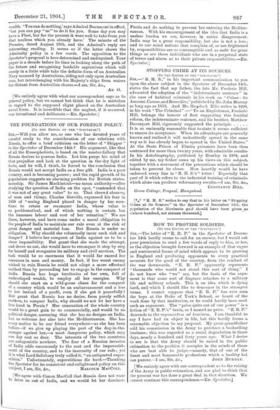THE FOUNDATIONS OF OUR. FOREIGN POLICY.
[TO THE EDITOR OF THE "SPECTATOR."] SD1,—Will you allow me, as one who has devoted years of careful study to the consideration of our relations with Russia, to offer a brief criticism on the letter of " Skipper " in the Spectator of December 14th ? His argument, like that of all the Russophobists, is based on the master-fallacy that Russia desires to possess India. Let him purge his mind of that prejudice and look at the question in the dry light of facts, and he will, I think, be forced to the conclusion that Russia would not accept India as a free gift. India is a poor country, and is becoming poorer ; and the rapid growth of its population suggests an alarming problem for British states- manship. Sir James Mackintosh—no mean authority—after studying the question of India on the spot, "contended that it was not of any great value" to us. That shrewd observer of men and things, Charles Greville, expressed his fear in 1859 of "seeing England placed in danger by her exer- tions to retain or reconquer India, whose value is so problematical, and of which nothing is certain but the immense labour and cost of her retention." We are there, however, and have come under a moral obligation to the people of India to maintain our rule even at the risk of great danger and material loss. But Russia is under no obligation. Why should she voluntarily incur such risk and danger? I believe her conquest of India against us to be a sheer impossibility. But grant that she made the attempt, and drove us out, she would have to reconquer it step by step for herself and reorganise its military and civil services. The task would be so enormous that it would far exceed her resources in men and money. In fact, if her worst enemy wished to ruin Russia he could not adopt a more effectual method than by persuading her to engage in the conquest of India. Russia has huge territories of her own, full of undeveloped wealth, to employ all her energies. Why should she start on a wild-goose chase for the conquest of a country which would be an embarrassment and a loss to her instead of a profit, even if she got it peacefully P But grant that Russia has no desire, from purely selfish motives, to conquer India, why should we not let her have a free hand in Persia ? Her annexation of the whole country would be a great gain to us commercially, and would be no political danger, assuming that she has no designs on India. Let us welcome her also into the Mediterranean. She has every motive to be our friend everywhere—as she has been before—if we give up playing the part of the dog-in-the- manger against her,—a most dangerous policy, which may one day cost us .dear. The interests of the two countries are antagonistic nowhere. The fear of a Russian invasion of India adds enormously to the cost and the impoverish- ment of the country, and to the insecurity of our rule ; yet it is what Lord Salisbury truly called it, "an antiquated super- stition." Unfortunately, superstitions die hard.—Thanking the Spectator-for its consistent and enlightened policy on this
[We agree with Canon MacColl that Russia does not want to drive us out of India, and we would let her dominate Persia and do nothing to prevent her entering the Mediter- ranean. With his encouragement of the idea that India is a useless burden we are, however, in entire disagreement. India may be a great responsibility, but she is not a loss ; and to our mind nations that complain of, or are frightened by, responsibilities are as contemptible and as unfit for great things as are those individuals who are in a perpetual state of terror and alarm as to their private responsibilities.—En. Spectator.]










































 Previous page
Previous page